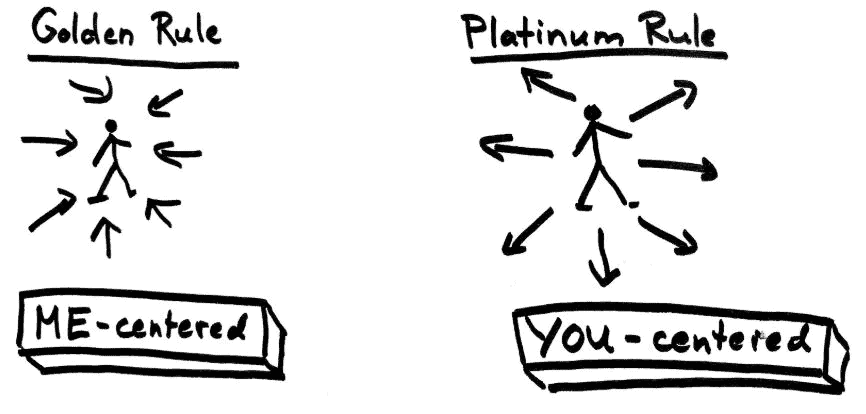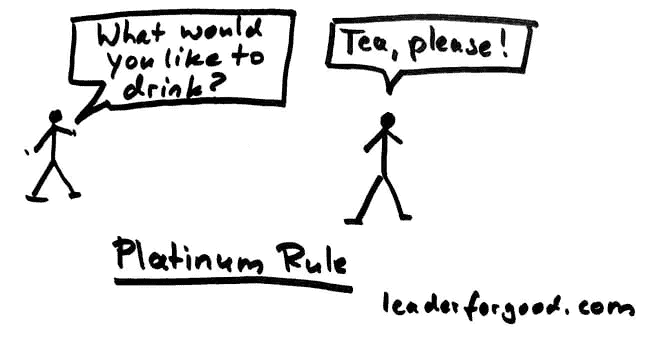We’ve all heard of the Golden Rule but do you know the Platinum Rule?
While both are guidelines for how we deal with others, there are also substantial differences between them. Let’s explore this:
How is the Platinum Rule different from the Golden Rule?
While the Golden Rule states: “treat others how you would like to be treated,” the Platinum Rule advises: “treat others how they would like to be treated.”
In other words, the Golden Rule places the emphasis on you. The Platinum Rule places it on the other person. The Golden Rule is "ME-centered," whereas the Platinum Rule is "YOU-centered."

Why is the Platinum Rule better than the Golden Rule?
While the Golden Rule is a great step into the right direction when it comes to treating others well, it misses the fact that we are all unique and may not have the same preferences (for instance, different people have different ways of expressing their love).
As such, the Platinum Rule encourages you to find out what the other person actually wants, rather than just inferring from your own preferences.
Here’s an example of the Platinum Rule vs. the Golden Rule in action:
Golden Rule: “I like to drink coffee when I’m at a friend’s place, therefore I will offer my guest coffee.”
In this scenario, you apply the Golden Rule because you treat others how they would like to be treated... even if you friend might hate coffee.

Platinum Rule: “I want to get my friend the beverage she likes, therefore I will ask her what she would like to drink.”
In this situation, you make sure that you treat your friend how she would like to be treated.

How can you put this into practice?
If you want to put the Platinum Rule into practice, you need to discover what the other person wants.
Generally, it’s best to ask the other person directly as our assumptions about what they might like can be totally off.
If you can’t ask them directly (for instance, because you want to get them a gift and asking would ruin the surprise), here’s what you can do:
- try to gather information by asking them indirectly (“so and so did this, what are your thoughts on that?”),
- observe them carefully to see how they react to different things (do they light up, do they close up?), and
- asking other people who might know them well enough to know their preferences.
Also, if you’re not completely sure they might like something you prepare for them (a gift, a surprise event, etc.), make sure that you give them an easy way out in case they don’t like it.
Takeaway
If you want to improve your relationships, stop following the Golden Rule and instead follow the Platinum Rule.
In general, applying the Platinum Rule requires more social competence than the Golden Rule, because you have to place yourself in the shoes of another person.
If you want to practice switching perspectives like that, you might like to pick up a good novel. According to research, reading fiction can help you improve your social ability.
Let's stay in touch!
Want good things delivered to your inbox? Sign up for my helpful emails. I'll get you started today with a short meditation that can increase your focus in just a few minutes.


Love this simple explanation! Such a useful concept.
I’m really glad you liked this explanation, Ryan! Thanks for commenting.
Great concept. We’re often so caught up in what we want that we don’t consider that others might prefer to be treated differently
Yes, so true! Thanks for sharing your perspective, Nigel!